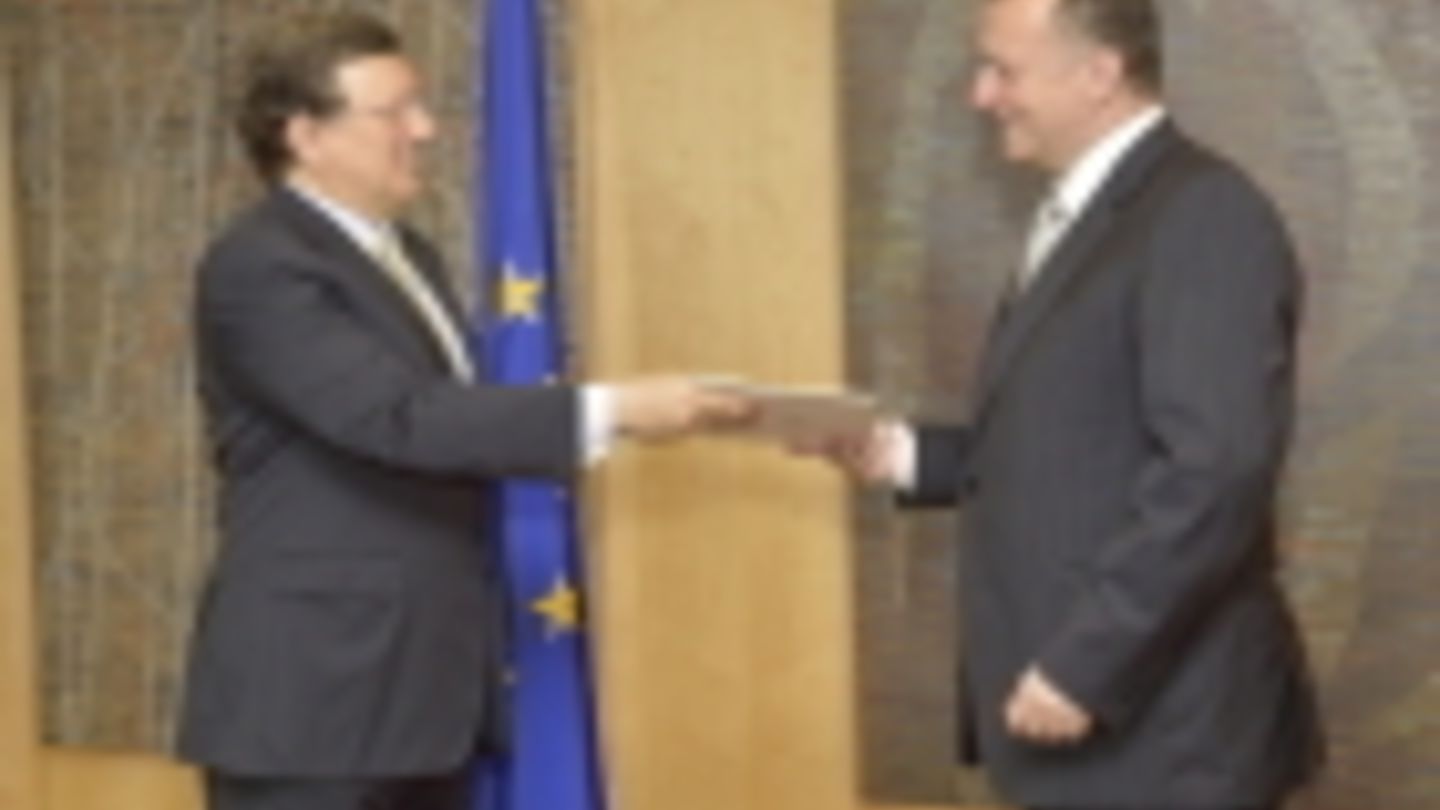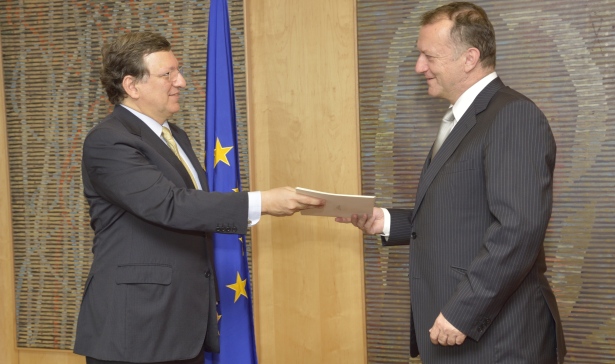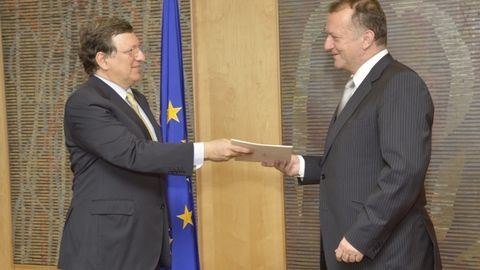Ambassador Lopandić on Serbia and EU relations

Interview with Duško Lopandić, Ambassador of the Republic of Serbia to the European Union. Questions from Adam Gazda.
Serbia recently started accession negotiations with the EU. When do you think these negotiations might be concluded?
The first intergovernmental conference was convened on 21st January. As you know this is only a formal matter. Already in June 2013, we started the screening process for 11 Chapters, out of 35. According to the so called new approach of the European Commission for accession negotiations we have started with Chapters 23 and 24 which concern justice, freedom and human rights and home affairs respectively. The whole accession process seems to be more demanding and lengthy than in previous cases, however we are determined to conclude it by 2018 with the idea to become an EU member during the period of the next financial framework.
Are there any areas where Serbia would like to negotiate transitional periods?
We are not there yet. Preparations of the negotiating positions on each chapter are ongoing. There is one issue, however, which is particular and specific to Serbian negotiations. That is chapter 35 which has in previous cases been reserved for the so called ‘’Other Items’’ and discussed at the very end of the negotiating process in order to settle all remaining, unresolved issues. However, in our case this chapter is dealing with the dialogue between Belgrade and Prishtina. According to the EU negotiating framework, relations between Belgrade and Prishtina should be normalized by the end of the accession negotiations. Somehow it seems that we have double or parallel tracks of negotiations. On one hand, we negotiate accession to the EU and on the other, there is an ongoing high level dialogue here in Brussels under the auspices of the High Representative of the European Union for Foreign Affairs and Security Policy, Catherine Ashton, with prime ministers Dacic from Serbia and Thaci from Prishtina taking part. Last April they concluded the ‘’Brussels Agreement’’. We are currently negotiating the implementation of this agreement. This is also a very demanding and very specific process.

H.E. Ambassador Duško Lopandić, Head of the Mission of Serbia to the EU, on the right, presenting his credentials to José Manuel Barroso (foto: Audiovisual Service EU)
What will be the biggest challenge for Serbia to face in the accession negotiations? Will it be the dialogue you mentioned?
On top of the expected challenges that every country is facing in the accession process, we have the rather complicated issue of a territory which has declared secession and which has de facto its own administration, legal system etc. On one hand, 23 EU member states view this territory as an independent state, and on the other, 5 member states have not recognized Kosovo. Legally speaking it is a very complicated, complex situation. Regardless, we are trying to find practical solutions to a number of issues. For example recently elections were held in one city in Kosovo, mostly populated by Serbs. We have tried to find a modus vivendi between the two sides, that is the Serbian and Albanian, but also to find out how the remaining Serbian minority population can live in this framework.
Recently 4 members of the European Parliament, including the rapporteur for Serbia Jelko Kacin, sent a letter to the Commission saying that the rule of law won't be established in Serbia unless the political background of the assassination of former prime minister Zoran Đinđić is fully explored. Do you think it is necessary to include the investigation in chapter 23 or do you perceive the call just as an initiative of 4 MEPs which won't have any reflection in accession negotiations?
This is maybe a politically significant issue. I would just like to recall that prime minister Đinđić was killed in March 2003. During the following few months even some legislation was suspended in order to find the perpetrators of this assassination and everything connected with the killing itself. The perpetrator, the organizers, everything has been more or less clarified. At the same time the government in 2003 appointed a special committee of several ministers and independent individuals that had to clarify let's call it extra legal connotations of the killing. It was a specific situation.
Frankly speaking I don’t really see what this demand would have to do with the legal procedures because it is obvious that some acts occur in certain specific conditions. But how you connect one with the other and how you could connect them legally is not clear to me. Maybe there could be a need to better clarify this killing and maybe some new facts can occur. I also know that recently there has been a decision to establish a new political investigation committee that would investigate this case. So I would not exclude the possibility that some new information could be found, maybe concerning connections between those criminal perpetrators and some political background. But it is difficult to predict whether it is possible or not.
Commission document Enlargement Strategy and Main Challenges 2013-2014 stresses the importance of regular communication on the benefits and opportunities that the accession process creates for all citizens of Serbia. How do you ensure this communication? Is there e.g. any information campaign?
There are two things in Serbia. Firstly, there is a regular information campaign organized by the Office for European Integration. The Office has already been efficiently functioning for 4 years. Secondly, we also have a diverse civil society with NGO groups like European Movement and others which are popularizing or explaining the EU process. Therefore I would not say that the public doesn’t have enough information. But it is a highly complex process, with the media often focusing on tricky issues. For example these days we have a very complicated issue dealing with the law on genetically modified organisms. The legislation was implemented by the previous parliament and it is so strict that it even blocks our accession to the World Trade Organization. On the other hand public opinion is very sensitive to issues such as health, food safety etc. It is always necessary to have a good communication.
In general I can say that the majority of the public in Serbia is supporting the EU integration. The level of support may of course differ from time to time, depending on the issues raised, however we remain rather confident that this broad support will continue. I think there will also be a referendum at the end of the process which is almost regularly held in every country that is about to join the EU. There is also support by majority of the political parties. I would say that the EU accession is rather a matter of consensus in Serbian society, it is not a dividing issue.
The same document also argues that Serbian Parliament often applies urgent procedures for the adoption of some laws which unduly limits time and debate for scrutiny of draft legislation. On the other hand it points out that Serbia should redouble its effort in order to align its legislation with the EU acquis, meaning besides the other things to adopt the laws faster. How will you ensure that these two, on the first sight contradictory recommendations, are put in practise?
I agree with you that they are contradictory. It also reminds me of the story from the previous enlargement in the beginning of 2000 when, in some candidate countries, there was often a need to speed up the adoption of the legislation. Often there was even no translation of some documents and some parliaments adopted the laws or implemented the regulations just in a foreign language. Obviously it is not the best way to proceed. It is also true that on one hand it is recommended to us not to use the urgent procedures. On the other hand there is a practical need because there are tens of thousands of regulations.
Serbia already has a certain platform for the adoption of the acquis which is now more detailed and which will be fitted to the framework of the negotiations. We will somehow try to manage these two necessities – to respect democratic, parliamentary procedures and comply with the need to redouble the effort. Sometimes it is not possible to plan this because there might be various political circumstances. For example now we have election campaign, there will be a new parliament by April this year, so obviously there is no legislative activity at all at that moment. Afterwards I am sure that the new government will be very ambitious and keen to go fast with the negotiations and reform in the country.
Now let's talk about the high level dialogue between Belgrade and Prishtina. Do you actually attend the meetings between the two prime ministers or is it always just them and the High Representative Catherine Ashton?
Sometimes these meetings are restricted to just the two of them but on some occasions other persons can attend. There are also many meetings of the supporting or implementing groups so it is not limited only to those you have mentioned. There is a whole structure around the dialogue.
How would you describe the ambience between Ivica Dacic and Hashim Thaci during these meetings? Is it relaxed or tensed or does it vary according to what the PMs have to negotiate?
At the beginning it was complicated and difficult. Our prime minister is often speaking about it because many issues were under considerations – whether they would shake hands, whether there would be joint photos, where they would be seated etc. Over time they have met frequently. Last time was their 21st meeting, in a period of just over one year. So you could say that the atmosphere now is more relaxed and down to business.
… it is quite a lot of time to become even friends.
Well, they don’t need to be friends, however the atmosphere can be more or less relaxed depending on how demanding the debated issues are. Mr Dacic, our prime minister, is well known for his good humour so he is in most cases the one who relaxes the atmosphere. For example, he once asked Thaci if he knew any Serbian songs. Dacic likes to sing and he is quite good at it.
On occasion the negotiations can be very tense and long – I remember one meeting where I assisted, that finished at 4 in the morning. Sometimes the meetings go in parallel – while the prime ministers are meeting in one room there can be meetings of the working groups in another. There are also SMS negotiations and other different ways of negotiating.
What is the biggest threat which could endanger or even halt the dialogue between Serbia and Kosovo representatives, particularly between the two prime ministers?
There are many issues to be implemented. What was said by some here in the EU is that not only the so called Brussels deal between Dacic and Thaci is important but that the implementation of this deal was extremely fast. Just to give you an example: if you take the case of the neighbouring country Macedonia, it took 8 months to begin with the implementation of the Ohrid agreement, once it was signed. In our case, we are already examining the functioning of the various issues of the Brussels agreement, less than a year into its implementation, difficult issues such as boundary lines crossings, election process, local autonomy, integration of police within the framework of Kosovo police… In general there are politically very sensitive and complex issues and we can say that they are being implemented. However, it all happened too fast and maybe in the future it won't be possible to do it all at the same time. We will have parliamentary elections in Serbia on March 16th and quite soon also in Kosovo, and it is not easy to negotiate in such circumstances. The post of the High Representative of the Union for Foreign Affairs and Security Policy will probably also change in the autumn. All these elements combined make the whole process more complicated.
In order to implement the April agreement the implementation plan was created. Many of its points were delayed. Why do you think there were some delays? Were the deadlines too short?
Indeed they were at times quite short but the majority of the agreed issues have already been implemented. There are some issues which are still outstanding such as the formation of the so called Community of the Serbian Municipalities – a point that hasn’t been finalised because of the local elections in the northern part of Kosovo which took too long. There are also certain remaining issues concerning the integration process in the area of justice.
A statute of the Community of Serbian Municipalities is supposed to be drafted. This hasn’t been done yet. Why? Was there any disagreement regarding its content?
I am sure it won’t be easy to draft the statute because of the somewhat different approaches that the two sides have on this matter. Prishtina views this Community as some sort of NGO, while we insist that it should contain elements of local autonomy, including authority over police, education, health system, even elements of judiciary system etc. The main reason why it hasn’t been discussed yet is the elections because it was complicated to organize them. In Mitrovica, the main city of the Serbs in Kosovo, there was recently a 4th round of elections, because the first elected mayor resigned prior to taking office, one candidate was arrested etc. So there are political problems on the ground.
Official financial resources available for the 4 municipalities in northern Kosovo inhabited mostly by Serbians should, according to some sources, amount up to 60 million euro for the year 2014. They should consist of funds from the central authorities, money coming from the EU, a development fund for the north, local revenues etc. Do you think this financing will be sufficient? In which sectors should the major allocation of investments in the north of Kosovo be?
Kosovo is the most disadvantaged region of the former Yugoslavia. And even if you look at Serbia it is by far the least developed than part of the country. There is certainly a need for investments in the area, especially the northern part of Kosovo, which was in a very particular situation, in some kind of standby life. They had what they call a parallel system of economy, based on the fact that there was no taxation system etc. There will be several thousands of people who should somehow find another job because of the transformation of the municipality system which is now happening. It shows how difficult the economic situation there is.
I think the number you mentioned would indeed be very helpful if used in the best manner. The European Commission claimed that they will provide some funds for northern Kosovo, something around 15 million euro or even more. Obviously there is also the fund for northern Kosovo which just started to function. Now it collects money from different crossing points between Serbia and Kosovo. But it is difficult to estimate the revenue because it will depend on the cross boundary trade etc.
Anyhow, there is a big need for building the infrastructure in Kosovo in general and in the north in particular. Financial support is also needed for small and medium size enterprises. For the time being, a number of people in northern Kosovo live just due to the budgetary support of Serbia and this should change. It doesn’t mean that Serbia will stop supporting education, health system and other public functions but it won’t be in the same way as it was before.
Do you see any other important points or outstanding issues which are necessary to discuss between prime ministers Dacic and Thaci in the upcoming months, except the judiciary which is already part of the plan?
Yes, there are many issues which are necessary to discuss however it was estimated that the best thing is first to fully implement the first Brussels agreement from April. The official title of this arrangement is the First Agreement, so it implies that there will be a second or a third one. Under the second one, we would like to have more arrangements and guaranties for the Serbian minority and its political participation in Prishtina’s institutions. It means to have guaranties for example for the number of minority members in the parliament, government, central judiciary institutions and so on. Secondly we would like to also have more guaranties for and an arrangement on the cultural heritage. Kosovo is important for Serbs in terms of symbolic and cultural heritage. There are hundreds of churches and monasteries all over Kosovo which show the past, the medieval state of Serbia. Some of them are very important from an artistic point of view but also with regard to the religion. For example the seat of the Serbian patriot is in Peč in Kosovo and not in Belgrade. We would also like to have negotiations on property issues. This I would call an elephant in the room because for decades Serbia has been investing in the Kosovo infrastructure, in the energy sector etc. And this issue is not settled because Prishtina partly privatised some companies but we never agreed with the way it was done.
